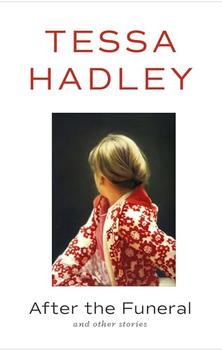Summary | Excerpt | Reviews | Beyond the book | Read-Alikes | Genres & Themes | Author Bio

In eight novels and four short story collections, Tessa Hadley has made a name for herself with a beautifully subtle style and deep insights into what makes relationships strain and sometimes break. The dozen stories in After the Funeral arise from everyday tragedies – illness, divorce, death, and estrangement – but amid the sadness there are opportunities for surprise connections and sudden decisions that might alter the whole course of a life.
Hadley is an English author, and most of her stories are set in London or the English countryside and are concerned with middle-class English families. The title story, which opens the book, is one of the strongest. In the 1970s, Lulu and Charlotte lose their father, an airplane pilot, to a heart attack. With money tight, they have to move out of their rental house and their mother has to go to work as a doctor's receptionist. As they become young women, the girls realize their mother is also sleeping with Dr. Cherry. The story goes on to reveal the full extent of the doctor's involvement with their lives.
Three more stories are set between the 1960s and 1980s; sometimes a year is given explicitly, but other times one must read between the lines based on period detail, such as a character sending a telegram. "Mia," dated to 1974, has Alison, a teenage aspiring chef with an eating disorder, enraptured by one of her sophisticated dinner party clients – and daring to offer her advice on how to get along with her stepson. "Funny Little Snake" also has a young woman forming an unforeseen bond. Valerie has become stepmother to nine-year-old Robyn and, witnessing the neglectful situation at the girl's mother's place, determines to protect her. "My Mother's Wedding," one of two entries narrated in the first person, delivers a shock about the day in the 1980s that 17-year-old Janey's mother was due to remarry much-younger Patrick.
Hadley can imagine herself into a teenager's perspective as successfully as a middle-aged person's, and she is alive to all the complications of families and affairs. Again and again, Hadley zeroes in on the moments that change a life forever, whether it be a rejection, a loss of innocence, or a chance meeting. Every so often, such coincidences can seem far-fetched: In "The Other One," Heloise attends a dinner party and is stunned to realize that her new acquaintance has a connection to her father's death in France over 30 years ago.
My overall favorite was the collection closer, appropriately titled "Coda," which takes place during the Covid-19 pandemic. Diane, divorced and retired early, is living with her 92-year-old mother during lockdown. The next-door neighbor is an elderly man who has a visiting carer, and Diane becomes obsessed with watching this healthcare worker, Teresa, out the window, and reading Madame Bovary in translation. As Diane says, "Madame Bovary was my inner life, stirred like rich jam into the blandness of my days." This story perfectly captures the sense of being stuck: fearing that life is over and yearning for more.
Hadley is not an author to read for edge-of-the-seat excitement, but rather for nuanced character portraits, true-to-life examination of relationship patterns, and superb prose, as in this line from "My Mother's Wedding":
Experience was etched into the tanned, leathery faces of all the other adults in my life; their experience—and that meant sex, mostly—was a calculating light in their eyes when they looked at me.
A few stories didn't stand out for me, however: one for its inconclusive ending, another for a slightly clichéd plot, and a third for being very short and fable-like. Bad Dreams and Other Stories, her previous collection from 2017, was a little more consistent in quality and cohesive in theme, in my opinion.
Still, I would recommend After the Funeral to fans of short stories by Amy Bloom, Hilary Mantel and Lorrie Moore, and fiction by Helen Dunmore and Penelope Lively. If you've enjoyed these authors' writing, Hadley's work is similarly unshowy yet quietly brilliant. In her stories, you'll find the same psychological understanding of characters and their entanglements, attention to plot details, and evocative writing.
![]() This review was originally published in The BookBrowse Review in August 2023, and has been updated for the
August 2024 edition.
Click here to go to this issue.
This review was originally published in The BookBrowse Review in August 2023, and has been updated for the
August 2024 edition.
Click here to go to this issue.

If you liked After the Funeral and Other Stories, try these:

by Guadalupe Nettel
Published 2025
From the International Booker Shortlisted author of Still Born, a powerful collection of stories about characters coping with estrangement, isolation, and the unknown.

by Andre Aciman
Published 2025
Three hypnotic novellas about obsessional love, missed connections, and enduring regret by the bestselling author of Call Me by Your Name.
Your guide toexceptional books
BookBrowse seeks out and recommends the best in contemporary fiction and nonfiction—books that not only engage and entertain but also deepen our understanding of ourselves and the world around us.